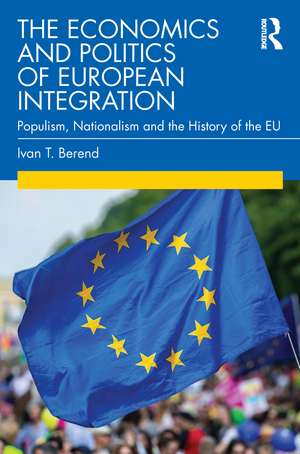The Economics and Politics of European Integration: Populism, Nationalism and the History of the EU
Autor Ivan T. Berenden Limba Engleză Paperback – 29 dec 2020
This illuminating text will be valuable reading for students and researchers across international economics, economic history, political economy and European studies.
| Toate formatele și edițiile | Preț | Express |
|---|---|---|
| Paperback (1) | 387.49 lei 6-8 săpt. | |
| Taylor & Francis – 29 dec 2020 | 387.49 lei 6-8 săpt. | |
| Hardback (1) | 1004.72 lei 6-8 săpt. | |
| Taylor & Francis – 29 dec 2020 | 1004.72 lei 6-8 săpt. |
Preț: 387.49 lei
Nou
Puncte Express: 581
Preț estimativ în valută:
74.14€ • 77.42$ • 61.23£
74.14€ • 77.42$ • 61.23£
Carte tipărită la comandă
Livrare economică 15-29 aprilie
Preluare comenzi: 021 569.72.76
Specificații
ISBN-13: 9780367558314
ISBN-10: 0367558319
Pagini: 288
Ilustrații: 5 Tables, black and white; 5 Halftones, black and white; 5 Illustrations, black and white
Dimensiuni: 156 x 234 x 15 mm
Greutate: 0.41 kg
Ediția:1
Editura: Taylor & Francis
Colecția Routledge
Locul publicării:Oxford, United Kingdom
ISBN-10: 0367558319
Pagini: 288
Ilustrații: 5 Tables, black and white; 5 Halftones, black and white; 5 Illustrations, black and white
Dimensiuni: 156 x 234 x 15 mm
Greutate: 0.41 kg
Ediția:1
Editura: Taylor & Francis
Colecția Routledge
Locul publicării:Oxford, United Kingdom
Public țintă
Postgraduate and UndergraduateCuprins
1. The New Postwar Economic and Political World Order: The Ground Paved for European Integration; 2. Federalist Dreamers and Pragmatic Integrationists: The Conceptualization and First Steps towards a United States of Europe; 3. The Main Institutional Structure and Policy Agendas of the European Community; 4. The New Challenges of Globalization and Global Political Disorder – Europe’s answer: regionalization (the 1980s–1990s); 5. Four Decades of Permanent Enlargement of the Union and its Dangers; 6. The triple crises and escaping ahead: 2008–2020; 7. Disappointment and Anger: The Rise of Anti-EU Populist Nationalism; 8. An Increasingly hostile international environment; 9. Conclusion: The Socioeconomic Achievements
Notă biografică
Ivan T. Berend has been Distinguished Research Professor at UCLA since 1990. He was born in Budapest, Hungary, and studied at the Budapest University of Economics and Lorand Eötvös University. He worked as an assistant professor at the University of Economics (1953), as an associate and full professor (1963) and as Distinguished Professor of History at University of California History Department (1960–1985) before taking up his current post.
Recenzii
In this compelling new book Ivan Berend places different issues currently facing the European Union - further enlargement, migration, anti-EU populism, economic crisis, Covid-19 - in the context of a sweeping history of the idea and reality of European integration since World War II.
Janick Marina Schaufelbuehl, Associate Professor of History, University of Lausanne
Ivan Berend's magisterial account of the "short" history of European integration makes landfall at just the right moment. As the EU faces a "perfect storm"—probably the most dire succession of crises since its founding— Berend's economic and political history of integration provides a compelling account of the EU’s evolution from a trade community to a political union. This book is a true tour de force, and can rightly be considered the last word on the Cold War origins of the EU.
Bojan Bugaric, Professor of Law, University of Sheffield
Janick Marina Schaufelbuehl, Associate Professor of History, University of Lausanne
Ivan Berend's magisterial account of the "short" history of European integration makes landfall at just the right moment. As the EU faces a "perfect storm"—probably the most dire succession of crises since its founding— Berend's economic and political history of integration provides a compelling account of the EU’s evolution from a trade community to a political union. This book is a true tour de force, and can rightly be considered the last word on the Cold War origins of the EU.
Bojan Bugaric, Professor of Law, University of Sheffield
Descriere
This book offers a comprehensive history of European integration. The special role of the United States in this process of integration, and the expansion and evolution of the European Union, is critically analysed.
